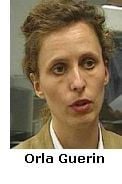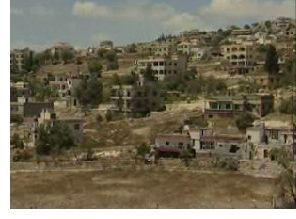Few tears were shed by our readership when the BBC’s Orla Guerin concluded her posting in the Middle East at the end of 2005. Guerin has, however, returned to report from Lebanon during the recent conflict. This alerted many media watchers, including the Drinking From Home blog, which compared Guerin’s 14 August report from the Lebanese village of Bint Jbeil with Alex Thomson’s of Channel 4 News on the same day.

Walking down the same street in the same village, both correspondents painted very different pictures of the level of destruction (emphasis added):
Guerin: “I haven’t seen a single building that isn’t damaged in some way. Many have been flattened, many have been singed. This town has really been wiped out.”
Compare this with Thomson: “As you can see, the centre of the town destroyed on a really wholesale scale, more so than since the last civilians left here, though it has to be said that on the outskirts, the suburbs – pretty much untouched by the Israeli attack and invasion.”
 Indeed, while Guerin would have you believe that Bint Jbeil has been entirely reduced to rubble, the view across the valley to the outskirts of town through the lens of a Channel 4 cameraman (pictured) confirms what Guerin evidently does not want BBC viewers to see.
Indeed, while Guerin would have you believe that Bint Jbeil has been entirely reduced to rubble, the view across the valley to the outskirts of town through the lens of a Channel 4 cameraman (pictured) confirms what Guerin evidently does not want BBC viewers to see.
Thomson even asks: “Does this bizarre landscape where so many buildings are really quite untouched and then some totally pancaked really mark the end for the Hezbollah?”
(See more images from Drinking From Home for visual evidence that Guerin and Thomson are reporting from identical locations.)
Much of the rest of Guerin’s report is presented in typical BBC style. Despite seeing the evidence of Hezbollah munitions and weaponry located in Bint Jbeil, Guerin states: “The international community may well ask how Israel can explain all this in the name of fighting Hezbollah.” More snippets of editorialising include:
Here in the south of Lebanon no-one doubts that Hezbollah won this war… In a month of fighting, Israel couldn’t beat Hezbollah – probably not how its ally the United States expected things to turn out. For George Bush this is a bad chapter in the war on terror… To many here and in the Arab world, Hezbollah are covered in glory…
Comments to BBC Complaints. Please let HonestReporting UK know if you receive a response by forwarding e-mails to [email protected].
DEBATE OVER BBC BOYCOTT
 According to the Jerusalem Post, the BBC’s one-sided coverage of the Lebanese conflict prompted some pressure on the Israeli Foreign Ministry to resume a boycott of the corporation and to withdraw credentials from its correspondents. The report stated that:
According to the Jerusalem Post, the BBC’s one-sided coverage of the Lebanese conflict prompted some pressure on the Israeli Foreign Ministry to resume a boycott of the corporation and to withdraw credentials from its correspondents. The report stated that:
diplomatic officials said the network had not been reporting the war fairly. Senior diplomatic officials in Jerusalem went as far as saying that “the reports we see give the impression that the BBC is working on behalf of Hizbullah instead of doing fair journalism.”
In the same paper however, Times columnist and frequent critic of the BBC, Stephen Pollard, argues that a boycott would be counter-productive despite the BBC’s anti-Israel bias:
But the idea that the BBC’s bias would change if it was denied access to press conferences and Israeli officials is risible. The BBC’s bias is the result of a pervasive contemporary left-liberal mindset, which holds that Israel is at best a bully and at worst illegitimate as a nation…. Boycotts do not work against organizations such as the BBC, whose existence and funding are guaranteed by British law and which are driven by a conviction in their inherent superiority.
Join in the debate on HonestReporting’s Backspin blog.
SMOKE & MIRRORS: TEST YOUR KNOWLEDGE
 Graphic images and photos from Lebanon have recently filled newspapers and TV screens around the world. Yet, it is becoming clear that some of these pictures do not tell the whole story or may even tell a completely different one to the reality. HonestReporting UK looks back at some recent and not so recent examples of distorted imagery. Click on this graphic and take a few minutes to complete this quiz and see whether you can tell fiction from fact.
Graphic images and photos from Lebanon have recently filled newspapers and TV screens around the world. Yet, it is becoming clear that some of these pictures do not tell the whole story or may even tell a completely different one to the reality. HonestReporting UK looks back at some recent and not so recent examples of distorted imagery. Click on this graphic and take a few minutes to complete this quiz and see whether you can tell fiction from fact.
to media bias.

